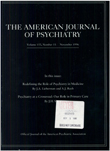Pharmacotherapy in outpatient psychiatric practice
Abstract
OBJECTIVE: This article examines some of the factors that influence the extent to which psychiatrists provide pharmacotherapy to their outpatients. METHOD: Data from the 1988-1989 APA Professional Activities Survey are used to define the characteristics of psychiatrists who prescribe medications to a high, medium, and low proportion of their outpatients in treatment. Outpatient assessments, evaluations, or consultations were excluded from this analysis. Correlations between psychiatric practice characteristics and rates of pharmacotherapy are examined. RESULTS: One-third of psychiatrists prescribed medications to less than 46.7% of their outpatients, one- third prescribed medications to between 46.7% and 84.6%, and one-third prescribed medications to over 84.6% of their outpatients. The psychiatrists in the last group included a proportionately higher number of young psychiatrists, men, nonwhites, those without psychoanalytic or child psychiatry training, those with larger caseloads, and those who worked in the public sector. These psychiatrists also treated a disproportionately large number of patients with schizophrenia and related psychotic disorders. In a multivariate model, clinical, practice, and educational variables, but not demographic variables, were found to correlate with the extent of pharmacotherapy provided. CONCLUSIONS: Psychiatrists vary widely in the extent to which they are involved in prescribing psychotropic medications. The diagnostic composition of their caseload, their work setting, and their educational background, but not their demographic characteristics, appear to influence the extent of their involvement.
Access content
To read the fulltext, please use one of the options below to sign in or purchase access.- Personal login
- Institutional Login
- Sign in via OpenAthens
- Register for access
-
Please login/register if you wish to pair your device and check access availability.
Not a subscriber?
PsychiatryOnline subscription options offer access to the DSM-5 library, books, journals, CME, and patient resources. This all-in-one virtual library provides psychiatrists and mental health professionals with key resources for diagnosis, treatment, research, and professional development.
Need more help? PsychiatryOnline Customer Service may be reached by emailing [email protected] or by calling 800-368-5777 (in the U.S.) or 703-907-7322 (outside the U.S.).



